Renault Trafic Bus VS Volvo V60 – Specs, Efficiency & Price Comparison
Which model is the better choice – the Renault Trafic Bus or the Volvo V60? We compare performance (150 HP vs 455 HP), boot capacity ( vs 519 L), efficiency (6.80 L vs 0.70 L), and of course, the price (38200 £ vs 41600 £).
Find out now which car fits your needs better!
The Renault Trafic Bus (Bus) is powered by a Diesel engine and comes with a Manuel transmission. In comparison, the Volvo V60 (Estate) features a Petrol MHEV or Plugin Hybrid engine and a Automatic gearbox.
When it comes to boot capacity, the Renault Trafic Bus offers , while the Volvo V60 provides 519 L – depending on what matters most to you. If you’re looking for more power, you’ll need to decide whether the 150 HP of the Renault Trafic Bus or the 455 HP of the Volvo V60 suits your needs better.
There are also differences in efficiency: 6.80 L vs 0.70 L. In terms of price, the Renault Trafic Bus starts at 38200 £, while the Volvo V60 is available from 41600 £.
Compare all the key specs now and find out which model fits your lifestyle best!
Renault Trafic Bus
The Renault Trafic Bus is a versatile and spacious option for those needing to transport multiple passengers comfortably. With its modern design and practical features, it is well-suited for both business and leisure purposes. Its efficient engine and smooth handling make it a reliable choice for long journeys.
detailsVolvo V60
The Volvo V60 exudes a sense of refined elegance with its sleek design and smooth contours, making it a standout in the estate car category. Inside, it offers a harmonious blend of luxury and functionality with premium materials and state-of-the-art technology, ensuring a comfortable driving experience. Its performance on the road is impressive, combining efficient handling with a powerful yet quiet ride, making it a favourite for those who appreciate both style and substance.
details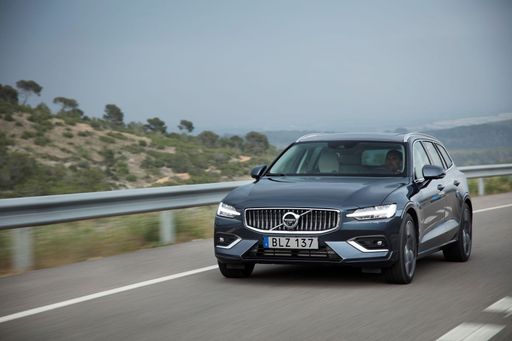 @ media.volvocars.com
@ media.volvocars.com
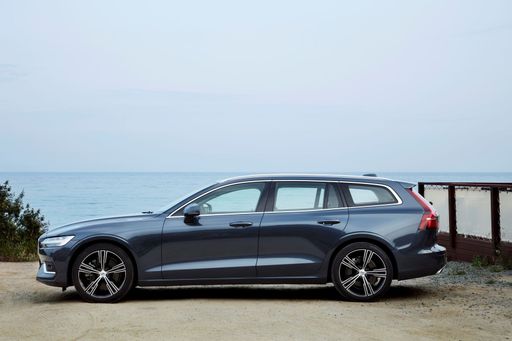 @ media.volvocars.com
@ media.volvocars.com
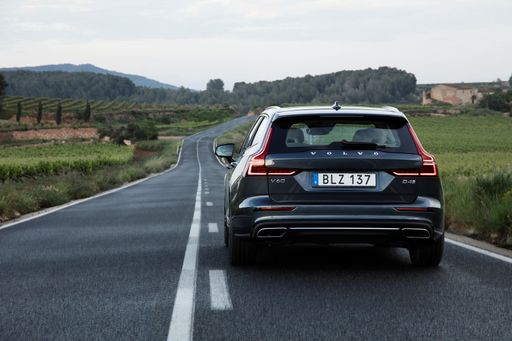 @ media.volvocars.com
@ media.volvocars.com
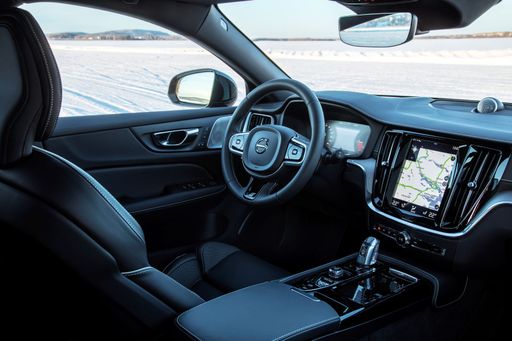 @ media.volvocars.com
@ media.volvocars.com
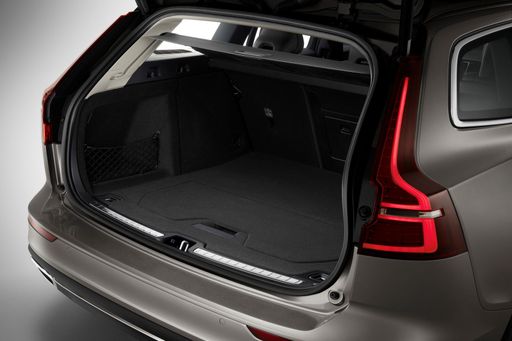 @ media.volvocars.com
@ media.volvocars.com

|
|
|
|
|
Costs and Consumption |
|
|---|---|
|
Price
38200 - 51100 £
|
Price
41600 - 64200 £
|
|
Consumption L/100km
6.8 - 7.2 L
|
Consumption L/100km
0.7 - 6.2 L
|
|
Consumption kWh/100km
-
|
Consumption kWh/100km
-
|
|
Electric Range
-
|
Electric Range
92 km
|
|
Battery Capacity
-
|
Battery Capacity
14.70 kWh
|
|
co2
179 - 188 g/km
|
co2
17 - 140 g/km
|
|
Fuel tank capacity
80 L
|
Fuel tank capacity
60 L
|
Dimensions and Body |
|
|---|---|
|
Body Type
Bus
|
Body Type
Estate
|
|
Seats
8 - 9
|
Seats
5
|
|
Doors
4
|
Doors
5
|
|
Curb weight
2031 - 2321 kg
|
Curb weight
1734 - 2064 kg
|
|
Trunk capacity
-
|
Trunk capacity
519 L
|
|
Length
5080 - 5480 mm
|
Length
4778 mm
|
|
Width
1956 mm
|
Width
1850 mm
|
|
Height
1973 - 1974 mm
|
Height
1432 mm
|
|
Payload
749 - 982 kg
|
Payload
466 - 506 kg
|
Engine and Performance |
|
|---|---|
|
Engine Type
Diesel
|
Engine Type
Petrol MHEV, Plugin Hybrid
|
|
Transmission
Manuel
|
Transmission
Automatic
|
|
Transmission Detail
Schaltgetriebe
|
Transmission Detail
Automat. Schaltgetriebe (Doppelkupplung), Automatikgetriebe
|
|
Drive Type
Front-Wheel Drive
|
Drive Type
Front-Wheel Drive, All-Wheel Drive
|
|
Power HP
110 - 150 HP
|
Power HP
197 - 455 HP
|
|
Acceleration 0-100km/h
13.6 - 16.5 s
|
Acceleration 0-100km/h
4.6 - 7.6 s
|
|
Max Speed
161 - 174 km/h
|
Max Speed
180 km/h
|
|
Torque
300 - 350 Nm
|
Torque
300 - 709 Nm
|
|
Number of Cylinders
4
|
Number of Cylinders
4
|
|
Power kW
81 - 110 kW
|
Power kW
145 - 335 kW
|
|
Engine capacity
1997 cm3
|
Engine capacity
1969 cm3
|
General |
|
|---|---|
|
Model Year
2023 - 2024
|
Model Year
2024
|
|
CO2 Efficiency Class
G
|
CO2 Efficiency Class
E, B
|
|
Brand
Renault
|
Brand
Volvo
|
Renault Trafic Bus
A Glimpse into the Renault Trafic Bus: An Icon of Versatility and Innovation
Amongst the plethora of vans designed for both business and leisure, the Renault Trafic Bus stands out as an exemplar of functionality, innovation, and style. Let's delve into what makes the Renault Trafic Bus a popular choice in the UK and across Europe, particularly focusing on its technical specifications and state-of-the-art features.
Performance Dynamics: Power Under the Hood
The Renault Trafic Bus, a staple in Renault's fleet, is driven by a robust diesel engine configuration with power outputs ranging from 110 PS to a formidable 170 PS. The diesel engines combine efficiency and power, offering torque figures between 300 to 380 Nm, ensuring smooth power delivery and capable load hauling.
Drivers can choose between manual and automatic transmissions, both designed to complement the Trafic's front-wheel-drive system. This flexibility ensures that drivers experience enhanced driving comfort whether they are navigating urban roads or cruising on the motorway.
Efficiency Meets Economy
The Trafic Bus showcases impressive fuel economy with consumption figures ranging from 6.8 to 7.2 litres per 100 kilometres. This efficiency is crucial for businesses aiming to minimise operational costs and for families seeking budget-friendly travel options.
With a generous fuel tank capacity of 80 litres, the Renault Trafic Bus is built to cover long distances with fewer fuel stops, making it an ideal choice for long haul journeys.
Technological Innovations and Comfort
The Trafic Bus isn't just about robust performance. Renault has integrated a suite of technological innovations designed to enhance driver and passenger comfort. Its cabins are equipped with the latest infotainment systems and safety technologies, providing an optimal blend of comfort and convenience.
The various trims, such as Life, Start, Spaceclass, and their respective EDC variants, cater to different needs and preferences, ensuring that customers can find the perfect configuration for their requirements.
Design and Dimensions: Space for Every Purpose
Space and versatility are at the heart of the Trafic Bus design. With its dimensions ranging from a length of 5080 to 5480 mm, and a width of 1956 mm, this vehicle offers ample room for passengers and cargo alike. The height stands between 1973 and 1974 mm, ensuring that even taller individuals can travel comfortably.
With seating for up to eight people and a payload capacity between 730 to 1010 kg, the Trafic Bus can transform seamlessly between a people-mover and a goods carrier.
Environmental Considerations
Renault has engineered the Trafic Bus with environmental responsibility in mind. The CO2 emissions range from 178 to 190 g/km, which, while modest for its class, aligns with the efficiency and performance goals set for this versatile vehicle. The CO2 efficiency class is rated as 'G', offering transparency in its environmental impact profile.
Conclusion: A Leader in Its Class
The Renault Trafic Bus continues to lead its segment through a blend of power, efficiency, and technological advancements. Whether it's for commercial transport or family adventures, the Trafic offers a reliable and adaptable solution, setting a high standard for multi-purpose vehicles.
For those seeking a distinguished blend of utility and comfort, the Renault Trafic Bus emerges as an exceptional choice, promising performance and innovation on every journey.
Volvo V60
The Volvo V60: A Glimpse at Scandinavian Ingenuity
The Volvo V60 stands as a beacon of the brand's commitment to combining luxury, performance, and environmental mindfulness in a family-friendly estate car. Boasting sleek looks and equipped with an array of powertrains, the V60 doesn't just cater to traditional fossil fuel users but also offers advanced plug-in hybrid options, pushing the boundaries of modern automotive engineering.
Powertrain Perfusion: A Diverse Line-up
Under the bonnet of the Volvo V60, you'll find a versatile range of engines, from the efficient mild-hybrid units to the high-performing plug-in hybrids. The series offers power outputs ranging from 197 to an impressive 455 PS, ensuring that there is a model to suit every driving preference. The innovative use of mild-hybrid technology not only maximises fuel efficiency, with consumption figures as low as 6.2 L/100 km, but also reduces emissions, making it a forward-thinking choice for everyday journeys.
Innovative Plug-in Hybrids
Among the V60's standout offerings is the T8 Plug-In Hybrid version, which combines a petrol engine with an electric motor, delivering an imposing 455 PS with an astonishingly low consumption of just 0.7 L/100 km. This hybrid variant also features an electric-only range of up to 92 km, allowing drivers to enjoy zero-emissions driving, which is perfect for urban commutes. The implementation of a 14.7 kWh battery lies at the heart of its efficiency, showcasing Volvo's dedication to sustainable innovation.
Design and Dynamics
Volvo has always been known for its iconic design aesthetics, and the V60 is no exception. Its elegant and dynamic exterior is complemented by a meticulously crafted interior, packed with cutting-edge features that enhance comfort and connectivity. The well-appointed cabin is spacious enough to accommodate five passengers comfortably, offering a generous baggage capacity of 519 litres—perfect for family getaways or transporting everyday essentials.
Advanced Safety Features
Volvo's dedication to safety is enshrined in the V60, equipped with advanced technologies aimed at protecting all road users. From adaptive cruise control to lane-keeping assistance and driver alert control, the V60's comprehensive safety suite ensures peace of mind even in challenging driving conditions. Volvo's IntelliSafe technology acts as an additional co-pilot, helping to mitigate accidents before they occur.
A Statement on Sustainability
As part of Volvo's larger ambition towards sustainability, the V60 represents a critical step forward. With improved fuel efficiency and lower CO2 emissions ranging from 17 to 168 g/km, this model aligns with global efforts to combat climate change. The broad adoption of hybrids and advancements in electric driving capabilities underscore Volvo's strategy to become a leader in sustainable transportation solutions.
Conclusion: The Future of Versatile Driving
The Volvo V60 is more than just an estate car; it's a testament to the future of driving—a blend of style, performance, and ecological responsibility. With its array of configurations, including the revolutionary plug-in hybrids, the V60 provides an irresistible option for eco-conscious drivers who refuse to compromise on sophistication and driving pleasure. As the automotive industry evolves, Volvo's V60 firmly positions itself at the cutting edge, proving that luxury and sustainability can indeed go hand in hand.
The prices and data displayed are estimates based on German list prices and may vary by country. This information is not legally binding.
